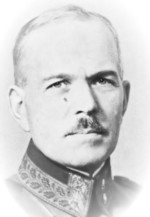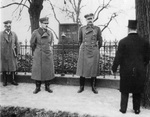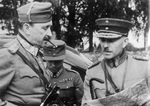Lennart Oesch
| Surname | Oesch |
| Given Name | Karl |
| Born | 8 Aug 1892 |
| Died | 28 Mar 1978 |
| Country | Finland |
| Category | Military-Ground |
| Gender | Male |
Contributor: C. Peter Chen
ww2dbaseKarl Lennart Oesch was born in Pyhäjärvi, Grand Duchy of Finland, Russian Empire in Aug 1892 to Swiss immigrants. He attended school in Sortavala, Finland (now Russia) and studied in the Department of Mathematics and Physics at the University of Helsinki from 1911 to 1915. In 1915, he joined the Jäger Movement and volunteered in the Royal Prussian 27th Jäger Battalion during WW1. He returned to Finland in Feb 1918 and joined the Finnish Army at the rank of captain. During the Finnish Civil War of 1918, he commanded at the battalion level. In 1920, he gave up his Swiss citizenship. Between 1923 and 1926, he studied in French military academies. Between 1926 and 1929, he commanded the war college Sotakorkeakoulu in Helsinki. In 1930, he was promoted to the rank of major general and was made the Chief of the General Staff. In 1936, he was promoted to the rank of lieutenant general.
ww2dbaseOesch remained in the role of Chief of the General Staff when Soviet forces invaded Finland in Nov 1939. In Mar 1940, he was taken out of the General Staff to personally lead the Coast Group after the disgrace of Major General Kurt Martti Wallenius; under his leadership, the Coast Group, consisted mostly older reservists and newly arrived and tired Lapland battalions, was able to hold key positions until the end of the Winter War in Mar 1940. He resumed the role of the Chief of the General Staff after the end of the Winter War and until Apr 1940 when he was made the commanding officer of II Army Corps.
ww2dbaseFinland and the Soviet Union resumed hostilities with the Continuation War in Jun 1941, which began with an advance by Finnish forces into Soviet territory, timed together with the German invasion of the Soviet Union. Oesch's unit, renamed IV Army Corps, was held back for two months, and did not advance into Soviet-held areas of Karelia until 22 Aug 1941. His unit made good progress, but the stress of war caused him to need a period of rest between 25 Aug and 30 Aug. In early Sep 1941, Finnish IV Army Corps defeated Soviet 23rd Army, and his men took 9,325 prisoners of war and captured many pieces of equipment at the cost of 3,000 casualties. In Mar 1942, Finnish forces were reorganized into three major groups, and Oesch took command of the Olonets Group in the Olonets Isthmus between Lakes Onega and Ladoga. In Apr 1942, the Olonets Group defeated an attempt by the Soviets to break through the Olonets Isthmus area. In Jun 1944, Soviet forces began breaking through Finnish main defensive positions, and Oesch was given the title Commander of the Isthmus Forces to stop the Soviets. Although the city of Viipuri (now Vyborg, Russia) was lost, Finnish victories at Tali-Ihantala, Bay of Viipuri, and Vuosalmi prevented a total collpase of Finland. He was awarded the Mannerheim Cross for his achievements in Jun 1944. Despite of his proven record, he was never promoted to the rank of full general due to him never becoming a favorite before his superior C. G. E. Mannerheim.
ww2dbaseAfter the end of the Continuation War, Oesch returned to Helsinki to serve as the Chief of the General Staff. In Sep 1945, he retired from military service. Knowing that he might be pursued by the Soviets, he contemplated escaping to Sweden, but ultimately decided to face whatever might come. Under Soviet pressure, a Finnish military court arrested Oesch and found him guilty as the commanding general of Finnish troops who had illegally executed 17 Soviet prisoners of war during the campaign against the Soviet 23rd Army in Sep 1941. He was sentenced to 12 years of penal servitude, but he was released early in Feb 1948. He was the only senior Finnish officer to be convicted of war crimes in WW2. In his retirement, he devoted himself to military history and wrote extensively on Finnish experiences in WW2. He also co-founded a popular magazine on WW2 Finnish history. He passed away in Helsinki in Mar 1978.
ww2dbaseSource: Wikipedia
Last Major Revision: Aug 2020
Photographs
 |  |  |  |
Lennart Oesch Timeline
| 8 Aug 1892 | Lennart Oesch was born in Pyhäjärvi, Finland. |
| 4 Mar 1918 | Lennart Oesch was given command of Finnish 8th Jäger Battalion. |
| 3 Mar 1932 | Lennart Oesch took on concurrent role as the Deputy Minister of the Interior Affairs. |
| 14 Mar 1932 | Lennart Oesch stepped down from his concurrent role as the Deputy Minister of the Interior Affairs. |
| 25 Aug 1941 | Lennart Oesch began a period of sick leave. |
| 30 Aug 1941 | Lennart Oesch returned to active duty. |
| 26 Jun 1944 | Lennart Oesch was awarded the Mannerheim Cross. |
| 19 Jul 1946 | Lennart Oesch was sentenced to 12 years of penal servitude for being the commanding general of Finnish IV Army Corps in Sep 1941, during which time troops of the unit illegally executed 17 Soviet prisoners of war. |
| 2 Feb 1948 | Lennart Oesch was released early from his penal servitude sentence in Finland. |
| 28 Mar 1978 | Lennart Oesch passed away in Helsinki, Finland. |
Please consider supporting us on Patreon. Even $1 per month will go a long way! Thank you. Please help us spread the word: Stay updated with WW2DB: |
» The Winter War
» Operation Silver Fox
» Battle of Tali-Ihantala and Battle of Vuosalmi
- » 1,167 biographies
- » 337 events
- » 44,601 timeline entries
- » 1,243 ships
- » 350 aircraft models
- » 207 vehicle models
- » 376 weapon models
- » 123 historical documents
- » 261 facilities
- » 470 book reviews
- » 28,497 photos
- » 365 maps
Winston Churchill
Please consider supporting us on Patreon. Even $1 a month will go a long way. Thank you!
Or, please support us by purchasing some WW2DB merchandise at TeeSpring, Thank you!